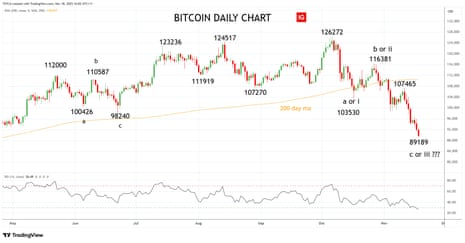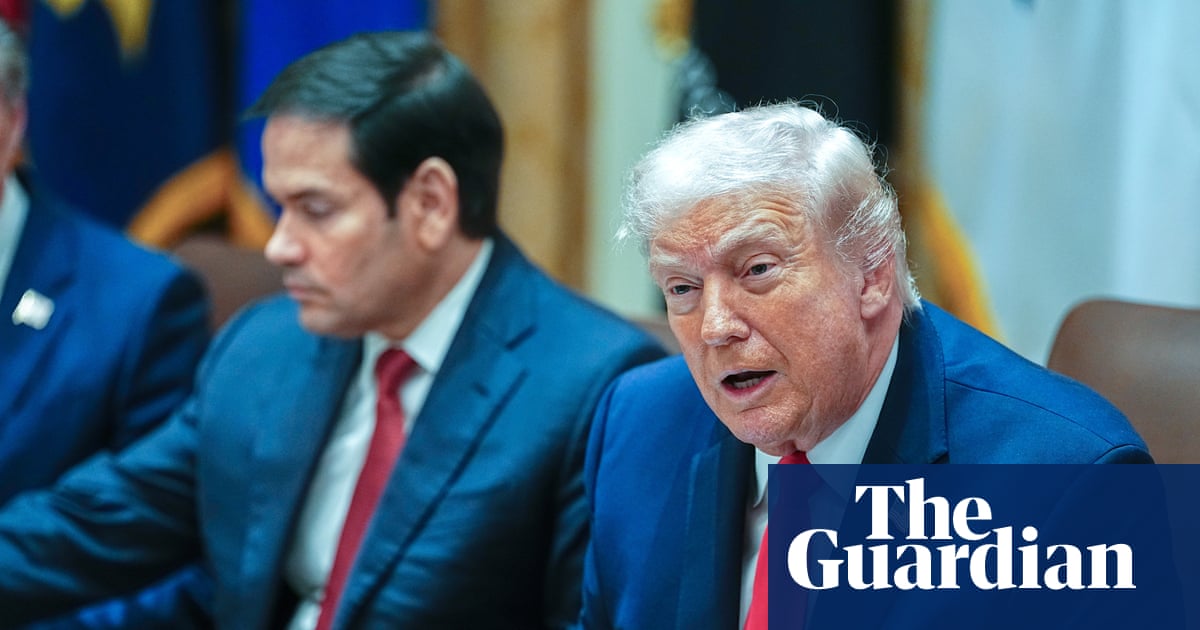Introduction: Market selloff continues
Good morning, and welcome to our rolling coverage of business, the financial markets and the world economy.
Global markets are racking up their fourth day of losses in a row, as concerns over technology valuations are worrying investors.
Asia-Pacific stocks have dipped to a one-month low today, amid signs that the enthusiasm that has driven stocks higher in recent months is fading, with shares, risky currencies and crypto assets all sliding
MSCI’s broadest index of Asia-Pacific shares outside Japan has lost 1.8%, slipping to its lowest level since mid-October. South Korea’s KOSPI has lost 3.5%, and Hong Kong’s Hang Seng is down 1.9%.
Japan’s Nikkei 225 is also having a very rough day, down over 3%, on concerns over an escalating dispute with China over Taiwan
Last night, the US stock market fell, with the S&P 500 share index closing at its lowest level in a month.
European stock markets are heading for losses when trading begins at 8am GMT too.
Various reasons are being cited for the mood change. Investors are fretting that US interest rates may not be cut as quickly as hoped, following hawkish commentary from some policymakers.
Jitters are building ahead of AI behemoth Nvidia’s results on Wednesday night.
The huge sums of money being committed by AI companies to fund their infrastructure is also raising eyebrows, especially as it is being increasingly funded by debt.
Last night, Amazon raised $15bn in its first US dollar bond offering in three years, adding to a spree of jumbo debt sales by technology firms as they race to fund artificial-intelligence infrastructure.
Michael Brown, senior research strategist at brokerage Pepperstone, explains:
Those Nvidia earnings, incidentally, once again stand as a major macro risk, as enthusiasm around the whole AI frenzy seems to ebb, with the market having shifted from an ‘all capex is good capex’ mood, to one where whether firms are actually able to monetise that expenditure has become the million (or more!) dollar question.
On that note, Amazon kicking-off a six-part bond sale didn’t help matters much yesterday, following hot on the heels of similar sales from Meta and Alphabet in recent weeks, and further fuelling concern that AI expansion is now being fuelled by debt, and not by free cash flow, in turn exacerbating jitters over the sustainability of all the spending that we currently see.
The agenda
-
10am GMT: Treasury Committee hearing on risks and rewards of embracing crypto
-
1pm GMT: Huw Pill, Bank of England’s chief economist, to give speech at Skinners Hall, London
-
3pm GMT: US factory orders and durable goods data for August (delayed by lockdown)
Key events Show key events only Please turn on JavaScript to use this feature
Klarna boss reveals he's nervous about AI spending splurge
The boss of buy-now-pay-later group Klarna has also warned about the tech industry’s multibillion-dollar dash to build data centres to power AI models.
Sebastian Siemiatkowski told the Financial Times that the huge sums being poured into computing infrastructure made him “nervous”.
He said:
“I think [OpenAI] can be very successful as a company but at the same time I’m very nervous about the size of these investments in these data centres. That’s the particular thing that I am concerned about.”
FTSE 100 falls 1%
Britain’s stock market has opened in the red, as the sell-off in global markets reaches Europe.
The blue-chip FTSE 100 share index has dropped by 101 points, or just over 1%, to 9,675 points, further away from the record high of 9,930 points set last week.
Mining stocks are among the big fallers, with Fresnillo down 6.4% and Endeavour Mining losing 4.7%.
The FTSE 250 index of medium-sized companies is also sliding, down 1.15%.
Britain to outlaw tickets touts, minister says
Britain is set to ban the resale of tickets to live events like music concerts and shows at inflated prices, UK housing minister Steve Reed has declared.
Reed told BBC News that said the practice of “ticket touting” - people buying tickets to sell them on at multiples of their face value - was hugely damaging for individuals who had to pay “through the nose” to attend.
Reed insisted:
“We are committed to ending the scandal of ticket touts.”
Reed was speaking a day after news broke that reselling a ticket at anything more than the price at which it was originally bought will be banned.
As my colleague Rob Davies reported:
Reselling tickets for profit is to be outlawed under plans due to be announced this week, the Guardian has learned, as the government goes ahead with a long-awaited crackdown on touts and resale platforms such as Viagogo and StubHub.
Ministers had been considering allowing touts – and ordinary consumers – to sell on a ticket for up to 30% above the original face value, as part of a consultation process that ended earlier this year.
2025 was suposed to be a big year for Bitcoin, with a pro-crypto president in the White House.
But it hasn’t quite worked out that way, as Victoria Scholar, head of investment at interactive investor, explains:
“Bitcoin is extending losses, trading around $90k, shedding around 2% fuelled by concerns about overvaluations in the tech sector and broader risk-off sentiment that is causing a ripple effect across global markets. Bitcoin has turned negative for 2025, after peaking on 6th October at an all-time high above $126k and has subsequently shed about 28.5%. Earlier it briefly broke below $90k for the first time in seven months.
This year was meant to be the year of the bitcoin bulls supported by a highly crypto friendly administration in the White House and Trump’s ‘less is more’ approach towards regulation.
However, fears of an AI bubble and concerns about the market’s heavy dependence on a handful of tech giants have caused investors to dial back their exposure to speculative assets such as bitcoin. There’s a general sense of nervousness that has captured the market mood lately and bitcoin appears to be in the firing line. Plus with hints that the Fed might not cut rates next month, riskier non-yielding assets like bitcoin look less attractive in a higher interest rate environment.”
Monday’s selloff in US stocks has set off some alarm bells for technical traders.
Both the S&P 500 share index and the tech-focused Nasdaq Composite closed below their 50-day moving averages, according to Dow Jones Market Data.
Marketwatch says this is a “worrysome” development, explaining:
The S&P 500 had consistently closed above its 50-day moving average from May 1 through last Friday — marking 138 consecutive trading days.
But on Monday, the index snapped its longest stretch above this average since the 149-trading-day period that ended on Feb. 26, 2007.
Crypto market has lost $1.2tn as traders shun speculative assets
More than $1tn has been wiped from the cryptocurrency market in the past six weeks.
According to data from CoinGecko, the global cryptocurrency market cap today is $3.15trn, down from $4,379trn on 7 October.
The Financial Times blames concerns about lofty tech valuations and the path of US interest rates for this sell-off in speculative assets, adding:
The total market value of more than 18,000 coins tracked by data provider CoinGecko has tumbled 25 per cent since a market peak on October 6, wiping about $1.2tn from their combined capitalisation.
Bitcoin hits lowest since April
Bitcoin has fallen to its lowest level since April, as the cryptocurrency sector is hit by a sharp selloff.
The world’s largest crypto coin dropped as low as $89,286 this morning, a seven-month low, meaning it has lost all its gains in 2025.
Bitcoin has now fallen by almost a third since hitting a record high at the start of last month.
Such volatility isn’t that unusual, though, as Tony Sycamore, analyst at IG, explains:
Bitcoin, the canary in the risk coalmine, slips below $90k for the first time in seven months as its decline starts to display more impulsive rather than corrective characteristics.
That said, it is notable that its ~29% pullback from the record $126,272 high of early October is now on par with the ~31.5% pullback witnessed at the $74,434 Liberation Day low, coming from the January $109,356 high.

Google boss warns 'no company is going to be immune' if AI bubble bursts
The head of Google’s parent company has warned that every company would be affected if the AI boom were to unravel.
Sundar Pichai, the CEO of Alphabet, has told the BBC that the growth of artificial intelligence (AI) investment had been an “extraordinary moment”, but cautioned that there was some “irrationality” in the current AI boom.
Pichai argued that the excitement around AI is very rational, given its potential.
But he also cautioned that there are moments when the tech industry “overshoots”, citing the excess investment we saw in the early days of the web.
Asked whether Google would be immune to the impact of the AI bubble bursting, Pichai said the tech giant could weather that potential storm, but added:
“I think no company is going to be immune, including us.”
Introduction: Market selloff continues
Good morning, and welcome to our rolling coverage of business, the financial markets and the world economy.
Global markets are racking up their fourth day of losses in a row, as concerns over technology valuations are worrying investors.
Asia-Pacific stocks have dipped to a one-month low today, amid signs that the enthusiasm that has driven stocks higher in recent months is fading, with shares, risky currencies and crypto assets all sliding
MSCI’s broadest index of Asia-Pacific shares outside Japan has lost 1.8%, slipping to its lowest level since mid-October. South Korea’s KOSPI has lost 3.5%, and Hong Kong’s Hang Seng is down 1.9%.
Japan’s Nikkei 225 is also having a very rough day, down over 3%, on concerns over an escalating dispute with China over Taiwan
Last night, the US stock market fell, with the S&P 500 share index closing at its lowest level in a month.
European stock markets are heading for losses when trading begins at 8am GMT too.
Various reasons are being cited for the mood change. Investors are fretting that US interest rates may not be cut as quickly as hoped, following hawkish commentary from some policymakers.
Jitters are building ahead of AI behemoth Nvidia’s results on Wednesday night.
The huge sums of money being committed by AI companies to fund their infrastructure is also raising eyebrows, especially as it is being increasingly funded by debt.
Last night, Amazon raised $15bn in its first US dollar bond offering in three years, adding to a spree of jumbo debt sales by technology firms as they race to fund artificial-intelligence infrastructure.
Michael Brown, senior research strategist at brokerage Pepperstone, explains:
Those Nvidia earnings, incidentally, once again stand as a major macro risk, as enthusiasm around the whole AI frenzy seems to ebb, with the market having shifted from an ‘all capex is good capex’ mood, to one where whether firms are actually able to monetise that expenditure has become the million (or more!) dollar question.
On that note, Amazon kicking-off a six-part bond sale didn’t help matters much yesterday, following hot on the heels of similar sales from Meta and Alphabet in recent weeks, and further fuelling concern that AI expansion is now being fuelled by debt, and not by free cash flow, in turn exacerbating jitters over the sustainability of all the spending that we currently see.
The agenda
-
10am GMT: Treasury Committee hearing on risks and rewards of embracing crypto
-
1pm GMT: Huw Pill, Bank of England’s chief economist, to give speech at Skinners Hall, London
-
3pm GMT: US factory orders and durable goods data for August (delayed by lockdown)

 2 months ago
55
2 months ago
55

















































